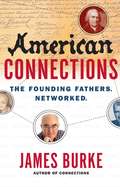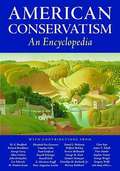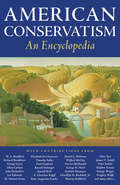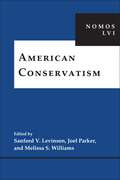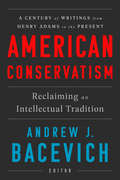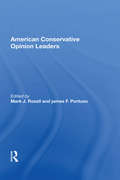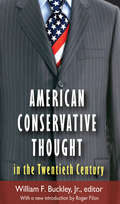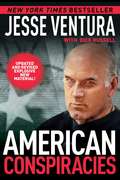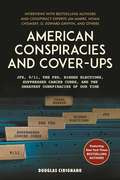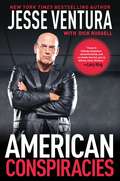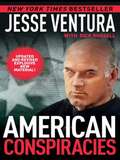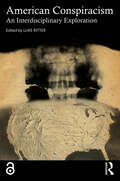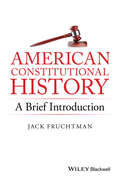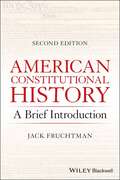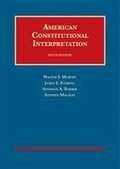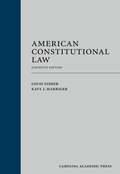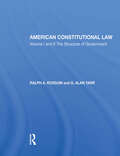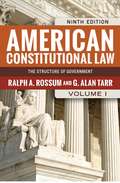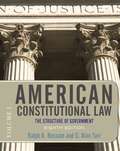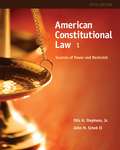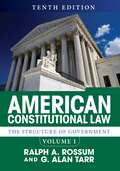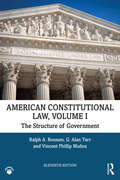- Table View
- List View
American Connections: The Founding Fathers. Networked.
by James BurkeUsing the unique approach that he has employed in his previous books, author, columnist, and television commentator James Burke shows us our connections to the fifty-six men who signed the Declaration of Independence. Over the two hundred-plus years that separate us, these connections are often surprising and always fascinating. Burke turns the signers from historical icons into flesh-and-blood people: Some were shady financial manipulators, most were masterful political operators, a few were good human beings, and some were great men. The network that links them to us is also peopled by all sorts, from spies and assassins to lovers and adulterers, inventors and artists. The ties may be more direct for some of us than others, but we are all linked in some way to these founders of our nation. If you enjoyed Martin Sheen as the president on television's The West Wing, then you're connected to founder Josiah Bartlett. The connection from signer Bartlett to Sheen includes John Paul Jones; Judge William Cooper, father of James Fenimore; Sir Thomas Brisbane, governor of New South Wales; an incestuous astronomer; an itinerant math teacher; early inventors of television; and pioneering TV personality Bishop Fulton J. Sheen, the inspiration for Ramon Estevez's screen name, Martin Sheen.
American Connector Co. (A)
by Gary P. Pisano Sharon RossiAmerican Connector Co. is forced to reexamine operations at its Sunnyvale plant when a Japanese competitor announces plans to build an "ultimate" plant in the United States. Case examines issues related to benchmarking a competitor's manufacturing capabilities and productivity. Allows students to compare two companies' manufacturing strategies and their implications for productivity and flexibility.
American Connector Co. (B)
by Gary P. PisanoPresents a plant manager's proposal to improve operations at American Connector Co. The plan attempts to imitate operations at DJC Corp., a successful Japanese competitor. Requires students to consider how changes in manufacturing impact productivity, flexibility, and overall strategy.
American Conservatism: An Encyclopedia
by Bruce Frohnen Jeremy Beer Jeffrey O. NelsonThe first comprehensive reference volume to cover what is surely the most influential political and intellectual movement of the last half century. This encyclopedia contains substantive entries of up to two thousand words on those persons, events, organizations, and concepts of major importance to postwar American conservatism.
American Conservatism: An Encyclopedia (Radical Conservatisms Ser.)
by Bruce Frohnen Jeremy Beer Nelson O. Jeffrey&“A must-own title.&” —National Review OnlineAmerican Conservatism: An Encyclopedia is the first comprehensive reference volume to cover what is surely the most influential political and intellectual movement of the past half century. More than fifteen years in the making—and more than half a million words in length—this informative and entertaining encyclopedia contains substantive entries on those persons, events, organizations, and concepts of major importance to postwar American conservatism. Its contributors include iconic patriarchs of the conservative and libertarian movements, celebrated scholars, well-known authors, and influential movement activists and leaders.Ranging from &“abortion&” to &“Zoll, Donald Atwell,&” and written from viewpoints as various as those which have informed the postwar conservative movement itself, the encyclopedia&’s more than 600 entries will orient readers of all kinds to the people and ideas that have given shape to contemporary American conservatism. This long-awaited volume is not to be missed.
American Conservatism: NOMOS LVI (NOMOS - American Society for Political and Legal Philosophy #10)
by Melissa S. Williams Sanford V. Levinson Joel ParkerA collection of essays that unpacks the history, nature, development, and beliefs of American ConservatismThe topic of American conservatism is especially timely—and perhaps volatile. Is there what might be termed an “exceptional” form of conservatism that is characteristically American, in contrast to conservatisms found in other countries? Are views that are identified in the United States as conservative necessarily congruent with what political theorists might classify under that label? Or does much American conservatism almost necessarily reflect the distinctly liberal background of American political thought?In American Conservatism, a distinguished group of American political and legal scholars reflect on these crucial questions, unpacking the very nature and development of American conservative thought. They examine both the historical and contemporary realities of arguments offered by self-conscious conservatives in the United States, offering a well-rounded view of the state of this field. In addition to synoptic overviews of the various dimensions of American conservative thought, specific attention is paid to such topics as American constitutionalism, the role of religion and religious institutions, and the particular impact of the late Leo Strauss on American thought and thinkers. Just as American conservatism includes a wide, and sometimes conflicting, group of thinkers, the essays in this volume themselves reflect differing and sometimes controversial assessments of the theorists under discussion.
American Conservatism: Reclaiming an Intellectual Tradition
by Andrew J. BacevichAs the nation stands at a crossroads, Andrew J. Bacevich urges us to reexamine the ideas and values of the American conservative tradition. What is American conservatism? What are its core beliefs and values? What answers can it offer to the fundamental questions we face in the twenty-first century about the common good and the meaning of freedom, the responsibilities of citizenship, and America’s proper role in the world? <P><P>As libertarians, neoconservatives, Never Trump-ers, and others battle over the label, this landmark collection offers an essential survey of conservative thought in the United States since 1900, highlighting the centrality of four key themes: the importance of tradition and the local, resistance to an ever-expanding state, opposition to the threat of tyranny at home and abroad, and free markets as the key to sustaining individual liberty. <P><P>Andrew J. Bacevich's incisive selections reveal that American conservatism—in his words “more akin to an ethos or a disposition than a fixed ideology”—has hardly been a monolithic entity over the last 120 years, but rather has developed through fierce internal debate about basic political and social propositions. Well-known figures such as Ronald Reagan and William F. Buckley are complemented here by important but less familiar thinkers such as Richard Weaver and Robert Nisbet, as well as writers not of the political right, like Randolph Bourne, Joan Didion, and Reinhold Niebuhr, who have been important influences on conservative thinking.More relevant than ever, this rich, too often overlooked vein of writing provides essential insights into who Americans are as a people and offers surprising hope, in a time of extreme polarization, for finding common ground. It deserves to be rediscovered by readers of all political persuasions.
American Conservative Opinion Leaders
by Mark J. Rozell James F. PontusoIn this book - one of the few academic works to scrutinise the major figures of American conservatism since the Reagan-Bush era began - the contributors identify and assess current trends in conservative political thought. Through their profiles of conservative opinion leaders, these scholars offer even-handed, critical examinations not only of the
American Conservative Thought in the Twentieth Century
by William F. Buckley Jr.If America has been an unsympathetic environment for conservatism, conservatism has, nevertheless, demonstrated an extraordinary tenacity in politics, literature, law, religion, economics, and social thought. Conservatism forms a dissent within the liberal tradition, and also deserves a hearing from any serious student of American history. William F. Buckley, Jr. brought this issue to the forefront in this outstanding collection featuring some of the greatest political thinkers of the twentieth century.This volume illuminates many aspects of the elusive 'conservatism' of which so much has been written, and helps to explain why it is that conservatism survives in politics, economics, social sciences, and the arts. Buckley has drawn from the works of renowned scholars and from those of relatively obscure figures, whose contributions he persuasively puts forward as deeply influential in the crystallization of modern conservative thought.This collection of essays begins by analyzing the history and background of American institutions. It then goes on to inspect strong American presumption in favor of the private sector and the nature of specific challenges to modern society, as well as the response of conservative thought and analysis to those challenges. Pluralists will welcome the approach in this book, and others will be excited by prestigious authors.
American Conspiracies
by Jesse Ventura Dick RussellNew York Times bestselling author Jesse Ventura is back with more conspiracies that our government wishes you didn’t know about! In this explosive account of wrongful acts and ensuing cover-ups, Jesse Ventura offers a different side to the stories we’ve all heard and read about in the history books. He takes a look at the wide gap between what the government knows and what is revealed to the American people. The media is complicit in these acts of deception, often refusing to consider alternate possibilities and dismissing voices that diverge from public opinion. He will look closely at the theories that have been presented over the years and examine the truth as well as the lies. Ventura does not shy away from the tough questions. As he states, "When I get denied something, I do the opposite of getting intimidated--I get angry. ” Now with new conspiracies added including information on the CIA torture scandal and the financial meltdown of 2008, you will see how the United States government continues to abuse our civil liberties and why we need to continue to stand up for what we know is right. You may not believe everything in American Conspiracies, but it is guaranteed to make you think harder about everything you do believe. Skyhorse Publishing, as well as our Arcade imprint, are proud to publish a broad range of books for readers interested in history--books about World War II, the Third Reich, Hitler and his henchmen, the JFK assassination, conspiracies, the American Civil War, the American Revolution, gladiators, Vikings, ancient Rome, medieval times, the old West, and much more. While not every title we publish becomes a New York Times bestseller or a national bestseller, we are committed to books on subjects that are sometimes overlooked and to authors whose work might not otherwise find a home.
American Conspiracies and Cover-ups: JFK, 9/11, the Fed, Rigged Elections, Suppressed Cancer Cures, and the Greatest Conspiracies of Our Time
by Douglas CirignanoInterviews with Jim Marrs, Noam Chomsky, G. Edward Griffin, and Other Experts “Those intrepid souls seeking to peer deeper into America’s greatest conspiracies should start with Douglas Cirignano’s voluminous book. Pick your favorite conspiracy—Cirignano has them all, with incisive interviews with knowledgeable experts. Don’t miss this tour de force of conspiracy facts." —Jim Marrs, journalist and New York Times bestselling author of Rule by Secrecy; The Rise of the Fourth Reich; The Trillion-Dollar Conspiracy; and Population Control: How Corporate Owners Are Killing Us. American Conspiracies and Cover-ups brings together interviews with the bestselling and brightest minds in the alternative history world to create the definitive guide to our country’s biggest secrets. Interviews include:Jim Marrs on the New World OrderNoam Chomsky on mainstream mediaThe JFK assassination with LBJ’s lawyerVeteran and author Robert B. Stinnet on Pearl HarborG. Edward Griffin on the Federal Reserve BankDr. William F. Pepper on MLK's assassinationProfessor David Ray Griffin on 9/11and more!Author Douglas Cirignano brings together the foremost experts in the field to answer these questions once and for all, and proves that mainstream histories don’t tell the real story.
American Conspiracies: Lies, Lies, and More Dirty Lies That the Government Tells Us
by Jesse Ventura Dick RussellIn this explosive account of wrongful acts and on-going cover-ups, Jesse Ventura takes a systematic look at the wide gap between what the American government knows and what it reveals to the American people. For too long, we the people have sat by and let politicians and bureaucrats from both parties obfuscate and lie. And according to this former Navy SEAL, former pro wrestler, and former Minnesota governor, the media is complicit in these acts of deception. For too long, the mainstream press has refused to consider alternate possibilities and to ask the tough questions. Here, Ventura looks closely at the theories that have been presented over the years and separates the fact from the fiction. In Ventura's eyes, the murder of Abraham Lincoln and the assassinations of the Kennedys and Martin Luther King, all need to be re-examined. Was Watergate presented honestly, or was the CIA involved? Did the Republican Party set out to purposefully steal two elections on behalf of George W. Bush? Has all the evidence been presented about the 9/11 attacks or is there another angle that the media is afraid to explore? And finally, is the collapse of today's financial order and the bailout plan by the Federal Reserve the widest-reaching conspiracy ever perpetrated? "If you're talking outspoken, unconventional, and no-holds-barred, you're talking Jesse Ventura," Larry King. "I wouldn't mind seeing Ventura run for president (or for senator, or dog-catcher, or whatever). In addition to talking conspiracy, he's likely to raise all sorts of other trouble. " Damon W. Root, Reason Magazine
American Conspiracies: Lies, Lies, and More Dirty Lies that the Government Tells Us
by Jesse Ventura Dick RussellIn this explosive account of wrongful acts and on-going cover-ups, Jesse Ventura takes a systematic look at the wide gap between what the American government knows and what it reveals to the American people. For too long, we the people have sat by and let politicians and bureaucrats from both parties obfuscate and lie. And according to this former Navy SEAL, former pro wrestler, and former Minnesota governor, the media is complicit in these acts of deception. For too long, the mainstream press has refused to consider alternate possibilities and to ask the tough questions. Here, Ventura looks closely at the theories that have been presented over the years and separates the fact from the fiction. In Ventura's eyes, the murder of Abraham Lincoln and the assassinations of the Kennedys and Martin Luther King, all need to be re-examined. Was Watergate presented honestly, or was the CIA involved? Did the Republican Party set out to purposefully steal two elections on behalf of George W. Bush? Has all the evidence been presented about the 9/11 attacks or is there another angle that the media is afraid to explore? And finally, is the collapse of today's financial order and the bailout plan by the Federal Reserve the widest-reaching conspiracy ever perpetrated? "If you're talking outspoken, unconventional, and no-holds-barred, you're talking Jesse Ventura."-Larry King "I wouldn't mind seeing Ventura run for president (or for senator, or dog-catcher, or whatever). In addition to talking conspiracy, he's likely to raise all sorts of other trouble."-Damon W. Root, Reason Magazine
American Conspiracism: An Interdisciplinary Exploration
by Luke RitterThis important collection explores the social effects of popular American conspiratorial beliefs, featuring the work of 22 scholars representing multiple academic disciplines.This book aims to better understand the phenomenon of American conspiracism by investigating how people acquire their beliefs, how conspiratorial stories function in politics and society, the role of conspiracy theories in the formation of national identities, and what conspiratorial beliefs mean to individual believers. Topics include QAnon, the Boogaloo Boys, the satanic panic, the Martin Luther King, Jr. Assassination, the Great Replacement Theory, anti-Catholic nativism, Flat Earth belief, Elvis Lives, COVID-19 denial, and much more. Each essay is accessibly and engagingly written without compromising quality.American Conspiracism is essential reading for students of psychology, political science, and U.S. history, as well as journalists, independent researchers, and anyone interested in American conspiracies.
American Constitutional History: A Brief Introduction
by Jack FruchtmanAmerican Constitutional History presents a concise introduction to the constitutional developments that have taken place over the past 225 years, treating trends from history, law, and political science. Presents readers with a brief and accessible introduction to more than two centuries of U.S. constitutional history Explores constitutional history chronologically, breaking U.S. history into five distinct periods Reveals the full sweep of constitutional changes through a focus on issues relating to economic developments, civil rights and civil liberties, and executive power Reflects the evolution of constitutional changes all the way up to the conclusion of the June 2015 Supreme Court term
American Constitutional History: A Brief Introduction
by Jack FruchtmanReveals how the Constitution has evolved over the past 235 years, featuring updated coverage of the 2020 presidential election and constitutional changes made by the Supreme Court up to June 2021 American Constitutional History: A Brief Introduction, Second Edition presents a concise and accessible history of the 235-year development of the Constitution since its ratification. The book is organized around five distinct periods in U.S. history—the New Republic, the Slave Republic, the Free-Market Republic, the Social Welfare Republic, and the Contemporary Republic—to demonstrate the evolution of the American republic and its founding document over time. With an engaging narrative approach, author Jack Fruchtman describes how constitutional changes have occurred through both formal amendments and informal decisions by the president, Congress, and the Supreme Court. Updated to cover the period from 2015 to 2021, the second edition examines the controversial presidential election of 2020 in which Donald Trump, despite losing the electoral and popular vote, claimed victory and espoused charges of widespread election fraud. New coverage of the addition of Neil Gorsuch, Brett Kavanaugh, and Amy Coney Barrett to the Supreme Court is complemented by discussion of important decisions made after 2015, including affirming same-sex marriage, a woman's right to abortion under certain circumstances, the right to own and carry a firearm, and the central place of religious liberty in American society. This book also: Highlights the Constitution's evolution through government regulation of the economy, individual and civil rights, and executive power Reflects the evolution of constitutional changes made by the Supreme Court up to June 2021 Discusses topics such as the ideological origins of the U.S Constitution, the Civil War and Reconstruction, the civil rights movement, and growth of executive power Includes chapter overviews, summaries, and descriptions of formal constitutional amendments ratified by the states American Constitutional History: A Brief Introduction, Second Edition is an excellent introductory textbook for upper-level undergraduate and graduate courses in American history and political science and a must-read for general readers seeking insights into the origins and evolution of the U.S. Constitution.
American Constitutional Interpretation (University Casebook Series)
by Sotirios A. Barber James E. Fleming Walter F. Murphy Stephen J. MacedoThis text uses original essays, cases, and materials to study the very enterprise by which a constitution is interpreted and a constitutional government created. It explores the American polity as both a constitutional and democratic entity. This volume is organized around a set of basic interrogatives: What is the constitution that is to be interpreted? Who are its authoritative interpreters? How should they go about their interpretive tasks? The new edition has been updated to include important new cases decided through June 2018, including Masterpiece Cakeshop, Ltd. v. Colorado Civil Rights Commission and National Institute of Family and Life Advocates v. Becerra. To maintain brevity, the authors have removed a number of cases from the casebook and placed them on the accompanying website.
American Constitutional Law
by Louis Fisher Katy HarrigerThis book, in addition to analyzing and including excerpts of court decisions, highlights the efforts of legislatures, executives, the states, and the general public to participate in an ongoing political dialogue about the meaning of the Constitution. It therefore rejects the idea that elected leaders and the public must passively receive and obey a series of unilateral and final judicial commands. The book covers all new developments in case law, congressional statutes, presidential policies, and initiatives undertaken by states under their own constitutions. Included are readings not only from cases but congressional floor debates, committee reports, committee hearings, presidential vetoes and statements, opinions of the Office of Legal Counsel in the Justice Department, state activity, Federalist papers, and professional journals. After introductory chapters on constitutional politics, the doctrine of judicial review, threshold requirements, judicial organization, and the process and strategy of decision making, the book focuses on these substantive areas: separation of powers (domestic and foreign affairs), federal-state relations, economic liberties, free speech and free press, religious freedom, due process, search and seizure, race, equal protection, privacy, and political participation. The book concludes with a chapter on efforts to curb the Supreme Court. Professors may choose between the one-volume casebound book or two paperbacks: Volume 1 on ''Constitutional Structures: Separated Powers and Federalism,'' and Volume 2 on ''Constitutional Rights: Civil Rights and Civil Liberties.''
American Constitutional Law 8E, 2-VOL SET: 2-VOLUME SET
by Ralph A. RossumAmerican Constitutional Law provides a comprehensive account of the nation's defining document. Based on the premise that the study of the Constitution and constitutional law is of fundamental importance to understanding the principles, prospects, and problems of America, the volumes in this set put current events in terms of what those who initially drafted and ratified the Constitution sought to accomplish. The authors examine the constitutional thought of the founders, as well as interpretations of the Constitution by the Supreme Court, Congress, the President, lower federal courts, and state judiciaries. Volume I focuses on federal rights and powers, and volume II focuses on individuals' rights and responsibilities. Available individually or as a two-volume set, they are perfect for a one- or two-semester course on constitutional law and civil liberties.
American Constitutional Law, Volume I
by Ralph A. Rossum G. Alan TarrThe study of the Constitution and constitutional law is of fundamental importance to understanding the principles, prospects, and problems of America. American Constitutional Law, Volume I provides a comprehensive account of the nation’s defining document, comparing how its provisions were originally understood by those who drafted and ratified it with contemporary constructions. The authors examine the constitutional thought of the founders, as well as interpretations of the Constitution by the Supreme Court, Congress, the President, lower federal courts, and state judiciaries to provide students with a sense of how the law has been interpreted over the years. Now fully updated, the ninth edition of this classic volume features several new cases including National Federation of Independent Business v. Sebelius, Arizona v. United States, and Caperton v. A. T. Massey Coal Company Visit westviewconlaw. com for instructor resources, including recently decided cases, material from prior editions, and a glossary.
American Constitutional Law, Volume I
by Ralph A. Rossum G. Alan TarrAmerican Constitutional Law provides a comprehensive account of the nation’s defining document. Based on the premise that the study of the Constitution and constitutional law is of fundamental importance to understanding the principles, prospects, and problems of America, this text puts current events in terms of what those who initially drafted and ratified the Constitution sought to accomplish. The authors examine the constitutional thought of the founders, as well as interpretations of the Constitution by the Supreme Court, Congress, the President, lower federal courts, and state judiciaries. Now fully updated, the eighth edition of this classic volume focuses on federal rights and powers and incorporates six new cases, including Boumediene v. Bush, Medellin v. Texas, Hein v. Freedom from Religion Foundation, and Plains Commerce Bank v. Long Family Land and Cattle Company. Also available in its eighth edition from authors Ralph A. Rossum and G. Alan Tarr: American Constitutional Law, Volume II: The Bill of Rights and Subsequent Amendments (Westview Press, ISBN 978-0-8133-4478-2).
American Constitutional Law, Volume I: Sources of Power and Restraint (5th Edition)
by John M. Scheb II Otis H. Stephens Jr.AMERICAN CONSTITUTIONAL LAW, Volumes I and II, combines cases, decisions, and authorial commentary to maximize your learning and understanding in this course. These comprehensive volumes cover the entire range of topics in constitutional law. Each of the chapters includes an extended essay providing the legal, historical, political, and cultural contexts for the set of edited decisions from the United States Supreme Court case that follows. In selecting, editing, and updating the materials, the authors emphasize recent trends in major areas of constitutional interpretation. At the same time, the authors include many landmark decisions, some of which retain importance as precedents while others illustrate the transient nature of constitutional interpretation. Because the book provides a good balance of decisions and authorial commentary, this text appeals to instructors of law as well as instructors of political science.
American Constitutional Law, Volume I: The Structure of Government
by Ralph A. Rossum G. Alan TarrA comprehensive core textbook and casebook that emphasizes precedent setting cases and alternative constitutional positions for courses in constitutional law and civil liberties.
American Constitutional Law, Volume I: The Structure of Government
by Ralph A. Rossum G. Alan TarrAmerican Constitutional Law, Volume I provides a comprehensive account of the nation's defining document, examining how its provisions were originally understood by those who drafted and ratified it, and how they have since been interpreted by the Supreme Court, Congress, the President, lower federal courts, and state judiciaries. Clear and accessible chapter introductions and a careful balance between classic and recent cases provide students with a sense of how the law has been understood and construed over the years.The Tenth Edition has been fully revised to include seven new cases, including key decisions National Labor Relations Board v. Noel Canning, Zivotofsky v. Kerry, Adoptive Couple v. Baby Girl, Horne v. Department of Agriculture and Comptroller of the Treasure of Maryland v. Wynne.A revamped and expanded companion website offers access to even more additional cases, an archive of primary documents, and links to online resources, making this text essential for any constitutional law course.
